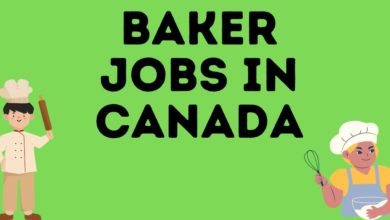International Jobs In Canada
Canada has a motto: “A Mari Used ad Mare” (Eng. “from sea to sea”). One is the Atlantic to the east, the other the Pacific to the west. To the north and to the south lies the USA and its northernmost state, Alaska. And in between? A country 28 times larger than the Federal Republic, but in which less than half of the population of Germany lives and works. Would you also like to earn your money in the “big white north” of America? Then you should read on now. We have a few valuable tips for you.

Job opportunities for expats in Canada
Of course, getting a job in Canada is not that easy either. But if you are motivated and start looking for a job in good time and correctly, then you have a good chance of finding an attractive job in the second largest country in the world. You can find out how to find a job and a new home in Canada below.
Why you should work in Canada
There is no question: Canada is extremely attractive as a place to work and live. The nature and vastness of the country are just two of many aspects. We’ve listed some of the top reasons why looking for a job in Canada is worthwhile here.
Familiarity
Canada is considered the “most European part” of the Americas. This is mainly due to the British-French heritage that characterizes the country to this day. This is where French “savoir vivre” and British courtesy meet the “American way of life”.
Open Society
Canada wasn’t officially founded until 1867, but the first immigrants arrived in the area as early as the 15th century. This status as an immigration country has not changed to this day. The “big white north” is correspondingly open and multicultural. Around 200 different ethnic groups live in Canada today and speak more than 100 different languages, and the trend is rising. There has also been a UFO landing site in St. Paul / Alberta since 1967.
High standard of living
Public transport and air traffic, medical care and local recreation: In the annual statistics, the metropolises of Vancouver, Toronto and Calgary consistently rank among the most livable cities in the world. Canadian nature also contributes to the quality of life: the Canadian forest alone makes up 40% of the area, the majestic Rocky Mountains lie on the border with the USA and on a round trip you will encounter a wide variety of landscapes, from polar climates to maritime zones, and that all in one country.
Read Also: Floor Covering Installer required in Canada
Read Also: Delivery Driver needed in Canada
High level of education
More than half of Canadians have graduate degrees, including from the universities of Toronto and Vancouver, which rank among the best educational institutions in the world. This has a direct impact on the labor market: Not only that around 30% of research in Canada takes place in the higher education sector (and accordingly ties up a large number of workers). Conversely, where there are many academics, there is a high demand for skilled workers in industry and trade – especially outside of the big cities.
low unemployment
Canada has an unemployment rate of a pliable 6%. The economy is stable and its room for maneuver is rated seventh best internationally. This is largely due to the wealth of natural resources: metals and minerals, oil and gas, wood and fish, wine and animal husbandry. But trade and finance also provide jobs for about 75% of Canada’s workforce.
How and where do you find jobs in Canada?
The Canadian labor market is not significantly different from that of other industrialized nations. Still, there are some details you should pay attention to when applying for a job in Canada. We have put together the most important information on job offers and applications for you.
Canada: Job Opportunities by State
The climatic conditions under which the people in Canada live and work are as varied as the country is huge. Nature and the environment affect the economy of every region in Canada. This results in very different job opportunities. We have listed the largest Canadian provinces and territories here and tell you which professions are most in demand there:
Canadian immigration programs at a glance
would you have known – There are over 100 different ways you can obtain permanent residency in Canada. The trick is finding the right Canadian immigration program. Here are the most popular: Family Class Immigration: You have Canadian relatives with a regular income who vouch for you. Skilled Worker: Having your workforce benefit Canada’s economy increases your chances of permanent resident status. Among the most popular programs for foreign workers.
Arranged Employment: You have a “confirmed” job offer from a Canadian employer prior to your arrival or you are already working in Canada on a work permit. Federal Skilled Worker Program: Many Canadian employers are unable to find enough skilled local workers to fill vacancies (mainly management, IT, engineering, financial services, healthcare and education).
The Federal Skilled Worker Program (FSWP) is designed to enable qualified foreign professionals and their eligible family members to work permanently in Canada and contribute to the country’s economy and multicultural society. Canadian Experience Class: You have at least one year of professional experience in Canada? Regardless of whether it is a temporary employment contract or long-term employment? This simplifies the process if you want to obtain a permanent residence and work permit from it.
It is also worthwhile to have a completed apprenticeship here, but it is not absolutely necessary. Provincial Nominee Program: Depending on your qualifications, you can also apply directly to an immigration program in a specific region if you have an education that is particularly in demand there. These programs are aimed at students, business people, skilled workers or semi-skilled workers, for example. Criteria may vary by province and territory. Québec Experience Class Program:
Read Also: How to become an RCMP officer in Canada
Read Also: Applying for a Multiple Entry Visa in Canada – Guide 2022
The province of Québec has its own immigration program: The Québec Experience Class Program or “Programme de l’expérience Québécoise” (PEQ). On the one hand, it was designed for students who have been enrolled at a university in Québec for at least three months or who graduated there no more than three years ago. On the other hand, employees who have obtained a degree in a desired profession within the last two years before applying and who have worked in a managerial position for at least one year can apply. Entry requirements include an “advanced intermediate” level of oral French and proof that you can support yourself, your spouse and any dependent children for at least three months.
How do I apply for a job in Canada?
The application process in Canada is similar to that in Germany. Just like here, it is worth a lot across the pond if you have a local contact person who will provide you with advice and action and provide you with news from the Canadian job market. The Canadian Embassy in Berlin will help you with questions about the recognition of your degrees from Germany. For most employers in Canada, a cover letter and a complete curriculum vitae (resume, without photo) are initially sufficient for the application itself. Depending on the region, you should also be able to write your application in French. Due to the distance, telephone or online job interviews are part of the usual reactions of interested employers. An application in Canada usually includes the following parts:
Application letter (cover letter)
You only need to write a cover letter if you are sending your application by post or email. For odd jobs, the cover letter is usually not that important. Nevertheless, a successful cover letter can help you get a job in case of doubt. Just like in Germany, you should make sure to address the responsible HR officer directly, go into detail about the desired requirements of the job description and explain plausibly why you are particularly suitable for this job.
Curriculum Vitae (Resume / CV)
The CV plays an important role in the application. In Canada, it is customary to write the resume without a photo and without personal information such as marital status or place of birth. The focus is on your jobs (including holiday jobs) and your education. You should create it counter-chronologically, i.e. name the most recent activity first.
The 4 best job search sites of 2023
Letters of recommendation / job references
Job references and other recommendations credibly underline your qualifications. Ask current and former employers about it in good time and attach it to your application.
interview
The same rules apply to job interviews and interviews in Canada as in Germany. Dress appropriately for the job (when in doubt, it’s better to be overdressed than underdressed). Prepare for the interview by thinking about questions from your future employer and preparing the appropriate answers in English. Two to three days after the interview, it is appreciated if you thank them either by phone or email for the personal interview and at the same time inquire about the current status. For smaller jobs (e.g. as part of Work & Travel, WWOOF), however, official job interviews are rather unusual.






